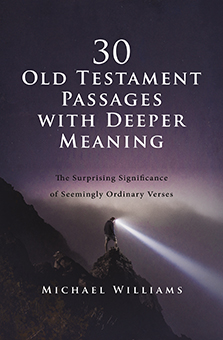
Atonement: How the Impossible Was Made Possible
“Atonement” is one of those religious words that rarely leaves the halls of seminaries and makes its way out into the wider world. For example, if I said to one of my friends with whom I had recently had a disagreement: “I’d like to invite you over to watch the game together this weekend as a step toward atonement,” he would probably respond with, “a step toward what?”
My friend’s unfamiliarity with the term would not be surprising. A Google Ngram search reveals that the word has been steadily declining in popular usage since its peak in 1811. Even regular Bible readers might be unfamiliar with the term because 93 of its 107 occurrences in the NIV appear in the books of Exodus (17), Leviticus (56), Numbers (18), and Deuteronomy (2)—not the first books Christians turn to for their daily devotions.
Clearly “atonement” needs to get out more. It needs to be more widely known because it lies at the very heart of the Christian faith. So let’s take a closer look at this critically important word.
What is Atonement?
The Oxford English Dictionary defines atonement as:
1. The condition of being at one with others; unity of feeling, harmony, concord, agreement.
2. The action of setting at one, or condition of being set at one, after discord or strife: a. Restoration of friendly relations between persons who have been at variance; reconciliation. b. The settling of differences, staunching of strife; appeasement.
3. spec. in Theol. Reconciliation or restoration of friendly relations between God and sinners.
The note to Exodus 25:17 in the NIV Study Bible adds a crucial detail in its definition of atonement as “the divine act of grace whereby God draws to himself those who were once alienated from him through a blood sacrifice” (italics added).
Why Is Atonement Necessary?
What the definitions for atonement presume, therefore, is the existence of some preceding rupture in the relationship between the parties involved. It is that disharmony, discord, strife, or alienation that atonement is meant to resolve. In the case of human beings’ relationship with God, the rupture is old and deep. It is caused by our sin.
Our estrangement from God began with Adam and Eve’s willful sin against him in choosing to listen to the serpent rather than God. They ate a malignant poison that found its way into every area of our beings. Now sin is part of our human nature. It was not originally so, but is now a continual and pervasive presence that corrupts that nature. As a result, every human being has sinned and continues to sin.
No one hammers this point home more effectively than the apostle Paul. Quoting many Old Testament passages, he lays down a blistering indictment of human sinfulness:
There is no one righteous, not even one;
there is no one who understands;
there is no one who seeks God.
All have turned away,
they have together become worthless;
there is no one who does good,
not even one. (Romans 3:10–12)
The words “no one” (4x), “not even one” (2x), “all,” and “together” leave the universality of the problem in no doubt. The sin of every single person has alienated them from God. This “pre-existing condition”is what makes atonement necessary if there is to be any restored relationship with God.
Where Can Atonement Come From?
We sin-infected human beings, however, cannot bring about atonement ourselves.
We understand from our everyday lives that the guilty party is usually responsible for atoning for their offense. For example, if I damage my relationship with my wife by forgetting our anniversary (which I have never done btw!), perhaps flowers and a nice dinner out could atone for my forgetfulness. Things are not so easily dealt with in our broken relationship with God, however. Our relationship with God is broken because of our rebellion against him (aka sin).
So how can we, who continue to rebel against God in our very nature, atone for our rebellion? We cannot atone for an offense that we continue to commit. We seem to be locked in a fatal feedback loop. Clearly, we need someone else to intervene and do what we cannot. If God wants a restored relationship with us (and what right do we have to expect that he would?), he himself will have to provide a way for it to happen.
Atonement in the Old Testament
In the Old Testament, God provided the sacrificial system as a way for sinful human beings to restore relationship with him. Because “without the shedding of blood there is no forgiveness” (Hebrews 9:22), for atonement to be realized, something would have to die.
Shedding the blood of the sacrifices effectively served as a substitute for shedding human blood and was the divinely prescribed way for Israel’s sin to be atoned for. This need to cleanse Israel from its sin was preeminently addressed by the annual Day of Atonement (Leviticus 16)—the one day of the year in which the high priest entered the most sacred room of the temple to sprinkle sacrificial blood on and in front of the atonement cover of the ark. The ark represented the invisible presence of God himself and was the focal point of this annual atonement rite.
But the fact that the high priest had to repeat this atonement rite year after year indicated its imperfect and forward-looking nature. Moreover, the blood of animals does not equate to the blood of human beings. The author of Hebrews describes the inadequacy and provisional character of the Old Testament sacrificial system for achieving real and lasting atonement:
It [i.e., the Old Testament provision for atonement] can never, by the same sacrifices repeated endlessly year after year, make perfect those who draw near to worship. Otherwise, would they not have stopped being offered? For the worshipers would have been cleansed once for all, and would no longer have felt guilty for their sins. But those sacrifices are an annual reminder of sins. It is impossible for the blood of bulls and goats [i.e., the animals sacrificed on the Day of Atonement] to take away sins. (
Atonement in the New Testament
In amazing and incomprehensible grace, God provided both the perfect human being and the perfect sacrifice for imperfect human beings by sending his son, Jesus Christ. Because Jesus was sinless, unlike the previous high priests, he did not need to make atonement for himself. Moreover, the sacrifice he offered was not in any way provisional or inadequate. It was as perfect as he is, because the sacrifice was him. The author of Hebrews explains:
Christ did not enter a sanctuary made with human hands that was only a copy of the true one; he entered heaven itself…. Nor did he enter heaven to offer himself again and again, the way the high priest enters the Most Holy Place every year with blood that is not his own…. But he has appeared once for all at the culmination of the ages to do away with sin by the sacrifice of himself. (Hebrews 9:24–26)
Atonement and the Gospel
The gospel, or “good news,” is that Jesus’ sacrifice of himself on our behalf achieves atonement with God for all who by faith claim Jesus as their representative. It is an atonement that was (and only could be) achieved by the shedding of human blood, the blood of a perfect human being, Jesus Christ.
Only through Jesus is the impossible made possible. Believers’ union with Christ by faith is their claim that he is their high priest and that his perfect sacrifice is made on their behalf. The good news is that just as Adam’s sin brought death to humankind, Jesus’ atoning sacrifice brings life. In the words of the apostle Paul:
The gift is not like the trespass. For if the many died by the trespass of the one man, how much more did God’s grace and the gift that came by the grace of the one man, Jesus Christ, overflow to the many! (Romans 5:15)
The fatal feedback loop is now broken. We are no longer helpless in our sinfulness. Through faith in Jesus Christ, our relationship with God is restored. We have atonement. Not only that, but God’s own Holy Spirit is at work within believers to conform them to the likeness of Christ (Romans 8:29) so that we experience more and more the riches of that restored relationship with the author of life.
The fatal feedback loop is now broken. We are no longer helpless in our sinfulness. Through faith in Jesus Christ, our relationship with God is restored. We have atonement. Not only that, but God’s own Holy Spirit is at work within believers to conform them to the likeness of Christ (Romans 8:29) so that we experience more and more the riches of that restored relationship with the author of life.
The author of Hebrews helps us make the connection between our atonement with God and our new lives in Christ:
Therefore, brothers and sisters, since we have confidence to enter the Most Holy Place [i.e., the very presence of God] by the blood of Jesus, by a new and living way opened for us through the curtain, that is, his body, and since we have a great priest over the house of God, let us draw near to God with a sincere heart and with the full assurance that faith brings, having our hearts sprinkled to cleanse us from a guilty conscience and having our bodies washed with pure water. Let us hold unswervingly to the faith we profess, for he who promised is faithful. And let us consider how we may spur one another on toward love and good deeds…. (Hebrews 10:19–24)
It is impossible to fully grasp the depth and multidimensional character of the atonement. No dictionary article, sermon, theological reflection, or blogpost can ever hope to explain it in all its richness. Perhaps it is best to conclude, as Leon Morris does, that “however it is viewed, Christ has taken our place, doing for us what we could not do for ourselves. Our part is simply to respond in repentance, faith, and selfless living.”

30 Old Testament Passages with Deeper Meaning
Feed your curiosity of the Bible by exploring the deeper meaning behind familiar Old Testament passages. Below the surface of every seemingly ordinary Bible verse lies a deeper meaning just waiting to be discovered. And these hidden insights aren’t just reserved for scholars, academics, or pastors. Anyone who knows where to look can uncover the surprisingly significant messages that the biblical authors intended for us to hear.
Learn More







I’m so blessed to have the understanding of the finished work of Christ Jesus. I was really struggling with guilt and condemnation.
My struggle to know the truth led me to read more and understand the Christian faith. I am a work of Christ and why he died to save us from the great sin.